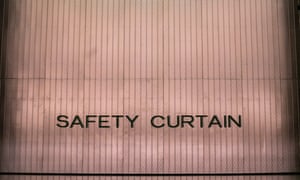Theatre is one of Britain’s great success stories: an economic growth engine and vital civic force which after the pandemic has so much to offer, fuelling local economies, nurturing our wellbeing, and bringing meaning and dignity to our lives …
These stirring words aren’t mine: they have all been used by senior cabinet ministers to describe the theatre industry.
Last Friday the government released its “roadmap” for reopening UK theatres. There is just one problem: it’s woefully vague with no dates or hard information – or anything of practical use – and it has demoralised everyone I’ve spoken to in the industry. What good is a road map when you don’t know whether the little fuel you have left in the tank will last the journey?
If the government truly believes in the value of the arts to the wellbeing of the nation, then it must get real and urgently replace words with action.
Examine the waffle-free facts.
At Royal & Derngate in Northampton 90% of our income is earned through ticket sales and bar revenue. Before March we had budgeted to receive more than a million pounds in such revenue a month. Now as the government’s job retention scheme winds down, we face costs beyond our means while we remain closed.
Live theatre demands proximity. Put bluntly, any form of social distancing is practically and economically disastrous. And that’s hoping audiences will return. A recent survey of 86,000 theatregoers reveals that less than 20% would come back to venues in the short term. But at Royal & Derngate, we’re starting to see tiny shoots of hope as audiences begin to book for future shows.

So what should a roadmap for theatre look like? Well, there’s no one-size-fits-all solution, but these would be our priorities at Royal & Derngate:
First, theatres need a “not before” date for meaningful reopening so they can plan ahead.
Second, we need a commitment of support beyond the short-term emergency funding grants offered by Arts Council England. The UK could follow Germany and France in creating a temporary fund to invest across the sector.
It is vital that this helps fund the freelancers who form 70% of theatre’s workforce, a third of whom do not qualify for the Treasury’s income-support schemes. Many will have no option but to leave the theatre entirely and I can’t overstate that without their crucial talents all efforts to save our venues will be in vain. Without core creators like writers, directors, designers, set builders, stage managers and technicians working alongside our brilliant in-house teams there will be no theatre productions on our stages.
This temporary fund could harness the joint potential of the commercial and subsidised theatre sectors, seeing government become a partner in one of our fastest growing industries – worth billions to the UK economy – with the taxpayer benefiting from future profits. It would not be a hand-out but a hand-up.
Third, we need to make sure that tightening belts doesn’t squeeze out people who have been historically underrepresented in the sector. Cultural diversity must be prioritised in the way that any investment is distributed. The social inequalities of our sector must be tackled. Our world leading D/deaf, neurodiverse and disabled talent must be championed. We can rebuild a fairer, more sustainable and more representative sector.
Fourth, theatres need to be at the centre of civic regeneration as post-lockdown Britain becomes more community-minded. Local councils should be incentivised to support ways in which theatre can bring benefits to education, community trusts, hospitals and prisons. Broadcasters should be galvanised to showcase more work from the theatre which supplies them with so much of their talent. The Department for Education could be encouraged to restore creative subjects to every school curriculum.
And fifth, once live performance returns, the existing theatre production tax relief scheme can be built upon together with support for businesses that supply theatres. Crucially, government must help underwrite the cost of insurance on productions to save organisations from going bankrupt if forced to close in the face of a second surge.
All those hailing the prime minister’s talk of a New Deal-like boost to get the economy going again should take note of how central the idea of the arts being made available to all were to America’s post-Depression plans. Without the New Deal, we might never have heard of Orson Welles, WEB Du Bois, Dorothea Lange and Mark Rothko.
We need action this day. Without it, theatres will close and irreplaceable talent will be lost. We’re ready in the wings, but we need a little help raising the curtain if we’re to return after the interval. And trust me, the next act will be our best yet.